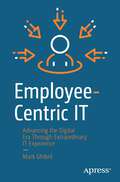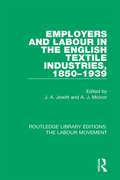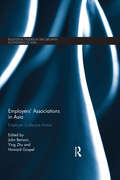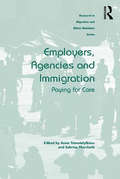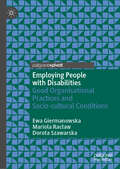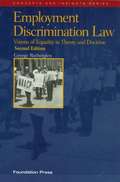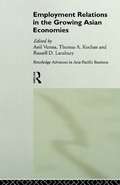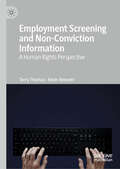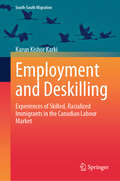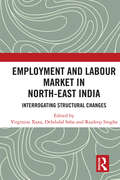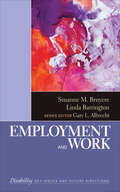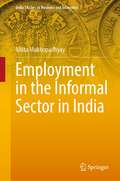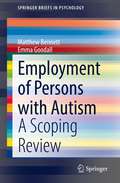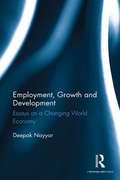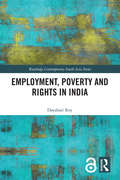- Table View
- List View
Employee Assistance Programs in Managed Care
by William Winston Norman WinegarMake sense of the managed care systems that dominate the world of EAP professionals and programs today!Employee Assistance Programs in Managed Care gives you a valuable overview of modern employee assistance programs. It compares and contrasts EAPs with managed behavioral care products and examines how EAPs are often provided in conjunction with managed care services. This timely book, vital in today’s ever-changing EAP climate, will familiarize you with essential managed behavioral technology such as the application of medical necessity criteria. This is especially important today in an environment dominated by employer- or insurer-sponsored managed care systems. You also get a helpful directory of EAP/managed care companiesEmployee Assistance Programs in Managed Care is your guidebook to today’s EAPs, providing vital information about: the services modern EAPs offer to employers and employees participating in networks to provide both therapy and EAP services how EAPs interface with managed behavioral care organizations how EAPs are sold how EAPs are marketed and managed today professional issues--certification, credentials, ethics, and more ways that counseling professionals can participate in them to the advantage of their clients--and to their professional practicesEAP professionals, clinical social workers, professional counselors, psychologists, benefit consultants, insurance brokers, psychiatric nurses, and clinical nurse specialists can all improve their practices and stay current with Employee Assistance Programs in Managed Care.
Employee Engagement 2.0: How To Motivate Your Team For High Performance - A Real-world Guide For Busy Managers
by Kevin KruseThis isn't just another ivory tower book on leadership. Employee Engagement 2.0 is the result of both massive research and real-world experience. The author, Kevin Kruse, is a former Best Place to Work winner, serial entrepreneur, and New York Times best-selling author. He has advised dozens of organizations, from Fortune 500 companies like SAP, to startups and non-profits, and even to the US Marines.
Employee Engagement in Media Management
by Stavros GeorgiadesThis book explores a major media management topic on the basis of case study research conducted in European, US and Brazilian media companies. More specifically, it examines the dynamics of employee engagement, aiming at organizational development through change. The book contemplates the discipline of Media Management through a management lens and focuses on the concept of employee involvement and its value with regard to successfully introducing change and achieving organizational development. It concentrates on providing the necessary information and organizational arrangements from the points of view of media managers and employees and highlights how this involvement can encourage employees to create and innovate. The book is directed towards researchers and students, as well as practitioners/professionals involved with media organizations.
Employee-Centric IT: Advancing the Digital Era Through Extraordinary IT Experience
by Mark GhibrilGlobal surveys from McKinsey, BCG, Gartner, and others show that less than 30% of digital transformation programs succeed in their missions to improve a company’s performance and employee productivity. This is due to the fact that IT efforts within the company do not center around the employee. This book will provide concrete steps to allow both IT professionals and business leaders to transform the way they deliver IT to employees – with the employee (the human) centered in their transformation.The concepts, models, checklists, and playbook you'll review are based on the author's many years of experience, lessons learned, and proven outcomes. IT organizations want to improve their employee experience but don’t know how and this is the “must have” book for those who don’t know where to start. More than two-thirds of today’s jobs require good digital and IT skills from employees. The expectations of management, who invest in these big digital transformations, is that the employees will become more productive, effective and help the bottom line. However, this can only happen through active and proactive change of IT operations and transformations that center the employee, rather than technology or senior management. This book reveals the benefit of moving towards an approach where employees gain technology aptitude, are up for technology change, and are willing to learn more for their benefit and even provide feedback on ways to improve these tools, trainings and support. You'll see how employee engagement and experience research, concepts, and implementations are growing rapidly across many organizations and taking a key role in their global strategies. Employee-centric IT will transform employees to own their digital literacy and development, and this in turn reduces or even eliminates the shadow IT need and allows the organization to drive and implement successful digital transformation.What You'll LearnUnderstand the value of being employee-centric in IT departments versus current modelsTake steps to win IT team’s acceptance of the changes needed to achieve employee-centricityBe proactive in providing training & information on digital & productivity toolsWho This Book Is ForBusiness leaders, IT and digital leaders as well as IT employees who would like to transform their current IT and Digital teams to be more employee centric and drive highest level of value, adoption and satisfaction for their IT/digital programs, transformations and investment.
Employer and Worker Collective Action
by Andrew G. Lawrence"This book compares sources of worker and employer power in Germany, South Africa, and the United States in order to identify the sources of comparative U. S. decline in union power and to more precisely analyze the nature of labor-movement power. It finds that this power is not confined to allied parties, union confederations, or strikes, but rather consists of the capacity to autonomously translate power from one context to the next. By combining their product, labor market, and labor law advantages through their dominant employers' associations, leading firms are able to impose constraints on labor's free collective bargaining regionally and nationally, defeating employer interests that are more amenable to labor in the process. Through an examination of these patterns of interest organization, the book shows, however, that initial employer advantages prove to be contingent and unstable and that employers are forced to cede to more far-reaching demands of increasingly organized workers"--
Employers and Labour in the English Textile Industries, 1850-1939 (Routledge Library Editions: The Labour Movement #19)
by J. A. Jowitt A. J. McivorFirst published in 1988. This collection of essays examines aspects of labour and industrial relations history in the textiles sector of Northern England during the mature phase of industrialisation before World War One and the period of retrenchment during the interwar economic recession. There are chapters on wool, worsted, silk, cotton spinning and weaving, and cotton finishing. The volume includes contributions by historians interested in employers’ organisations and management strategies, labour, trade union and women’s history. As such it provides a broader framework in which relationships between capital and labour are analysed. The book also incorporates some of the recent research on particularly neglected areas of social history, most notably on women workers and on the industrial relations policies of employers in textiles.
Employers' Associations in Asia: Employer Collective Action (Routledge Studies in the Growth Economies of Asia)
by Ying Zhu John Beson Howard GospelEconomic growth in Asia over the past half century has led to significant changes in societies, business organization and the nature of work. This has been accompanied by the rise in some countries of trade unions and also of employers’ associations. This book explores the nature of employers’ associations in the major countries of Asia. It considers how employers’ associations have developed in recent decades, how changes in market structures and the profile of economies have affected employers’ associations, how employers’ associations deal with issues to do with pay and employment conditions, and how they interact with regulation and the state. The book shows how the differing political and institutional contexts of different countries, and different economic conditions, greatly affect the nature of employers’ associations and also the wider context of labour markets and trade unions.
Employers, Agencies and Immigration: Paying for Care (Research In Migration And Ethnic Relations Ser.)
by Anna Triandafyllidou Sabrina MarchettiExploring the performance by immigrants of domestic and care work in European households, this book places the employer centre-stage, examining the role of the employer and his or her agents in securing the balance between work, family and welfare needs, as well as investigating both who the employers are and the nature of their relationships with migrant workers. With attention to the dynamics of inequality, as class, ethnicity and gender become intertwined in a location that is at once home and workplace, this volume is organised into sections that deal with the subjectivities of employers and their relationships with their employees in the home; the re-organisation of welfare and care arrangements at state level; and the wider area of migrant domestic and care work, with the transformation of the au pair scheme. Bringing together the latest empirical work from across Europe, Employers, Agencies and Immigration will appeal to social scientists with interests in migration, ethnic and class relations, immigrant labour and domestic work and the sociology of the family.
Employing People with Disabilities: Good Organisational Practices and Socio-cultural Conditions
by Ewa Giermanowska Mariola Racław Dorota SzawarskaDeveloping better employment and management practices for a diverse workplace is quickly becoming a major concern amongst most modern organisations; however, a lack of research into good practices has a limiting effect. Dealing specifically with disabilities, this pioneering work is based on international research spanning several European countries to demonstrate best practice. Aiming to fill a gap in knowledge, the authors offer interdisciplinary insights into managing diversity in the workplace, taking into account various social and cultural contexts. Providing analysis and recommendations for adapting organisational practices to different workplace settings, this Palgrave Pivot is a vital read for scholars of HRM and diversity management, as well as policy-makers and practitioners.
Employment Discrimination Law: Visions of Equality in Theory and Doctrine (2nd ed.)
by George RutherglenIntroductory text to employment discrimination law
Employment Guarantee Schemes
by Michael J. Murray Mathew ForstaterMost of the scholarship on the Job Guarantee up to now has been in the context of industrialized nations such as the United States and Australia. Employment Guarantee Schemes directs attention to challenges and opportunities of enacting direct job creation policies in developing countries and BRICS, including China, Ghana, Argentina, and India. This book also investigates how the Job Guarantee might interface with other policy goals, such as environmental sustainability. Eschewing narrow individualistic and economistic approaches, these interdisciplinary, historical, and comparative studies delve deeper into how both unemployment and true full employment can affect community.
Employment Law For Business
by Dawn D. Bennett-Alexander Laura Hartman<P>Bennett-Alexander and Hartman's Employment Law for Business, addresses law and employment decisions from a managerial perspective.<P> It is intended to instruct students on how to manage effectively and efficiently with full comprehension of the legal ramifications of their decisions.<P> Students are shown how to analyze employment law facts using concrete examples of management-related legal dilemmas that do not present clear-cut solutions.<P> The methods of arriving at resolutions are emphasized, so that when the facts of the workplace problem are not quite the same, the student can still reach a good decision based on the legal considerations required by law, which remain relevant.
Employment Law: A Guide to Hiring, Managing, and Firing for Employers and Employees
by Lori B. RassasEmployment Law: A Guide to Hiring, Managing, and Firing for Employers and Employees offers a coherent overview that follows the sequence of day-to-day events--from job creation to recruitment, including compensation and benefits, leave entitlements, and more.
Employment Relations in the Growing Asian Economies (Routledge Advances in Asia-Pacific Business)
by Thomas A. Kochan Russell D. Lansbury Anil VermaThis book analyses the role of employment relations in the context of economic development in some of the key Asian economies: China, Hong Kong, India, Malaysia, the Phillipines, Singapore, South Korea and Taiwan. In recent years, these Asian economies have become increasingly more open and export-driven, and there is strong interest all over the world in the Asian economic `miracle' among practitioners and scholars alike. Although much has been written on this region, few books have concentrated on the human resource aspects of this growth. The authors build on the basic premise that the initial success of these countries has lain in low wages and suppression of workers' rights. However, they point out that as employment relations evolve enterprises will either pull out due to rising wages, or stay and prosper by adapting to higher wages. Cases are provided to illustrate both of these features. The evidence in the book suggests that unless a synergy is created between firm-level and state-level human resource policies in areas such as skill formation and workers' need for voice, economic growth is unlikely to be sustainable.
Employment Screening and Non-Conviction Information: A Human Rights Perspective
by Kevin Bennett Terry ThomasThis book provides a critical overview of the policy frameworks underpinning the contemporary practices of non-conviction information disclosure during pre-employment ‘screening’. It questions how a man can walk free from a criminal court as an innocent person only to have all the court details of his acquittal passed to any potential employer.Despite several million ‘enhanced’ criminal background checks being performed each year, there has been little discussion of these issues within academic literature. Non-conviction information, also known as 'police intelligence', is a less well-known check provided alongside the criminal record check. This book seeks to define what is meant by non-conviction information and to provide a clear and simple explanation of how this decision making process of police disclosure to employers is made. It also considers the extent to which these practices have been subjected to legal challenges within the UK and explores how public protection is balanced against individual rights.
Employment and Citizenship in Britain and France
by John Edwards Jean-Paul RévaugerThis title was first published in 2000: One of the most significant features to emerge in the world of work during the past decade has been the change from long-term employment, often with one employer, to a pattern of short-term, flexible working arrangements involving short-term contracts, frequent spells of unemployment, rapid movement into and out of employment and greater labour mobility. This text examines the social and economic consequences of this employment flexibility. The book derives from the 2nd Anglo-French Conference on the Transferability of Social Policy held in 1998, which focused on the problems created by employment flexibility and the appropriate policy responses, it also presents commentaries on the consequences of flexibility in Britain and France. It brings together British and French perspectives on such policy questions as the impact on families and their ability to plan in an atmosphere of economic insecurity, the manner in which French and British welfare systems are adapting, the impact on citizens' rights, the need, in both countries, to make pension arrangements more adaptable, and the potential for a "European citizenship" approach to the problem.
Employment and Deskilling: Experiences of Skilled, Racialized Immigrants in the Canadian Labour Market (International Perspectives on Migration)
by Karun Kishor KarkiThis book examines the socio-economic integration of skilled, racialized immigrants in Canada. Although many arrive with advanced education and professional credentials, they often face significant barriers to securing meaningful employment and career advancement. Central to the book are three interrelated areas of inquiry: (a) deskilling and downward mobility, (b) structural inequality in the labor market, and (c) the gendered dimensions of deskilling. Drawing on primary data, the book investigates how the Canadian labor market continues to reproduce systemic inequalities despite its rhetoric of diversity and inclusion. It offers policy recommendations to advance employment equity, gender justice, and inclusion of immigrants in the workforce. This book is a vital resource for students, scholars, and practitioners and is especially well-suited for graduate courses in the humanities and social sciences, including labor studies, sociology, social work, migration studies, and gender studies.
Employment and Labour Market in North-East India: Interrogating Structural Changes
by Debdulal Saha Virginius Xaxa Rajdeep SinghaThis book examines the structural changes in the labour market in North-East India. Going beyond the conventional study of tea and agricultural sectors, it focuses on the nature, pattern and structure of work and employment in the region as well as documents emerging shifts in the labour force towards farm to non-farm dynamics. The chapters explore historical developments in employment patterns, labour market policies, issues of gender and social-religious dimensions, as well as point to growing forms of casual, informal and contractual labour across sectors. Through large-scale data and detailed case studies on unfree labour in plantations and those employed in crafts, handloom and the manufacturing industry, the book provides insights into labour and employment in the region. It also delves into the temporal and spatial dimensions of non-farm employment and its relationship with rural income distribution and labour mobility. By bringing interdisciplinary perspectives from scholars working on North-East India, this work fills a major gap in the political economy of the labour market in the region. The volume will be useful to scholars and researchers of development studies, North-East India studies, labour studies, economics, sociology and political science as well to those involved with governance and policymaking.
Employment and Tourism: New Research Perspectives in the Social Sciences (SpringerBriefs in Sociology)
by Bertrand Réau Christophe GuibertThis book proposes a new and original analysis of tourism employment in order to understand the multiple dimensions (economic, cultural, temporal, geographical, etc.) of this cross-cutting sector. It offers an overview of French knowledge, mainly in sociology, anthropology, geography and law, in the light of singular empirical fields. The diversity of disciplinary approaches, methods and questions allows for comparisons between various segments of the tourism employment market in France and with other countries. Based on in-depth case studies, this book will be a valuable resource for students and academics who wish to understand the specificities of tourism employment and the methods for studying them, as well as for professionals in the sector and decision-makers in European tourist destinations who wish to enrich their approaches to these phenomena.
Employment and Work (The SAGE Reference Series on Disability: Key Issues and Future Directions)
by Susanne Marie Bruyère Linda BarringtonThis volume in The SAGE Reference Series on Disability explores issues facing people with disabilities in employment and the work environment. It is one of eight volumes in the cross-disciplinary and issues-based series, which incorporates links from varied fields making up Disability Studies as volumes examine topics central to the lives of individuals with disabilities and their families. With a balance of history, theory, research, and application, specialists set out the findings and implications of research and practice for others whose current or future work involves the care and/or study of those with disabilities, as well as for the disabled themselves. The presentational style (concise and engaging) emphasizes accessibility. Taken individually, each volume sets out the fundamentals of the topic it addresses, accompanied by compiled data and statistics, recommended further readings, a guide to organizations and associations, and other annotated resources, thus providing the ideal introductory platform and gateway for further study. Taken together, the series represents both a survey of major disability issues and a guide to new directions and trends and contemporary resources in the field as a whole.
Employment in the Informal Sector in India (India Studies in Business and Economics)
by Ishita MukhopadhyayThis book examines the transition, transformation and future of the informal sector, informal work and informal workers in India from the perspectives of development economics as well as those of international organisations.Though the informal sector has a long tradition in India, it has been transformed in the wake of neoliberal economic policy. The sector took on new prominence in the 1980s, and has since grown much stronger and established itself as the country’s dominant sector. Several reports on the informal sector appeared during this period, and the status of the sector in India is positioned in the context of this international scenario.The major debate concerns the definition of this sector. While international labour statisticians had suggested a mechanism of definition and measurement of the sector, Indian official statistics took a different approach. The book analytically elaborates the different definitions and measurement controversies in different countries and contextualises the official Indian position. While deliberating on the size, contribution, productivity, and potential of the informal sector, the heterogeneity and decomposition of the sector with respect to these aspects are also suggested. The book develops a political economic interpretation of the historical transition of the informal sector in India, employing heterodox economics as a theoretical basis, with a critical note on standard neoclassical economic analysis. The final part of the book focuses on understanding the development of capitalism in the country under neoliberalism, as that development is crucial to understanding the informal sector in any country, and particularly in India. In the current context, the volume will be of great relevance to researchers, non-government organizations, policy makers and international organisations working on the topic.
Employment of Persons with Autism: A Scoping Review (SpringerBriefs in Psychology)
by Emma Goodall Matthew BennettThis scoping review furnishes the reader with a contemporary overview of research about employment conditions related to persons on the autism spectrum. In this book six guiding questions are used to address various aspects of employment for persons on the autism spectrum, including job opportunities, removing barriers to employment, becoming successful at work, and management issues for employers working with people on the autism spectrum. The contents of this scoping review can appeal to many different readers. Persons on the autism spectrum can learn about proven strategies that they can use to maximise their success in the workplace. Employers, tertiary students, and lay people can learn methods that they can use to help employees on the autism spectrum obtain and maintain employment. Finally, researchers can learn about the current limitations of our knowledge about the autism spectrum and employment.
Employment, Growth and Development: Essays on a Changing World Economy
by Deepak NayyarThis book examines the critical themes of employment, growth and development to focus on challenges and opportunities, both old and new, in the contemporary world economy. The essential theme that runs through the book is that there is a strong relationship not only between employment and growth, but also between employment and development, where the causation runs in both directions. The author shows how employment transforms economic growth into meaningful development by providing livelihoods and incomes to people. While the book is primarily concerned with developing countries, it considers industrialized countries as points of reference or comparison, since the latter are a large part of an interdependent world, in which problems faced by the two sets of countries are frequently connected and sometimes common. The ten essays in this volume also provide a macroeconomic analysis of development problems situated in the wider context of a changing world economy, exploring possible solutions, to understand the implications for countries and for people. A timely collection by an eminent economist, this book will be useful to teachers, students and researchers in economics, especially those interested in macroeconomics, political economy and development studies.
Employment, Poverty and Rights in India (Routledge Contemporary South Asia Series)
by Dayabati RoyIn comparison to other social groups, India’s rural poor – and particularly Adivasis and Dalits - have seen little benefit from the country’s economic growth over the last three decades. Though economists and statisticians are able to model the form and extent of this inequality, their work is rarely concerned with identifying possible causes. Employment, Poverty and Rights in India analyses unemployment in India and explains why the issues of employment and unemployment should be the appropriate prism to understand the status of wellbeing in India. The author provides a historical analysis of policy interventions on behalf of the colonial and postcolonial state with regard to the alleviation of unemployment and poverty in India and in West Bengal in particular. Arguing that, as long as poverty - either as a concept or as an empirical condition - remains as a technical issue to be managed by governmental technologies, the ‘poor’ will be held responsible for their own fate and the extent of poverty will continue to increase. The book contends that rural unemployment in India is not just an economic issue but a political process that has consistently been shaped by various socio-economic, political and cultural factors since the colonial period. The analysis which depends mainly on ethnography extends to the implementation of the ‘New Rights Agenda’, such as the MGNREGA, at the rural margin. Challenging the dominant approach to poverty, this book will be of interest to scholars working in the fields of South Asian studies, Indian Political Economy, contemporary political theories, poverty studies, neo-liberalism, sociology and social anthropology as well as development studies.
Employment, Retirement and Lifestyle in Aging East Asia (Social Policy and Development Studies in East Asia)
by Xinxin MaThis project offers a comprehensive look at aging policies across East Asia, where a demographic dividend fuelled rapid growth and is now aging into a lower-speed economy. With a comprehensive look at numerous East Asian societies, including China, Japan, Korea, and other regions, the book is rich in comparative insights and strategies into what is effective for policymakers and employers. As the Asian century begins, this book will be an invaluable resource for economists, policymakers and demographers.



